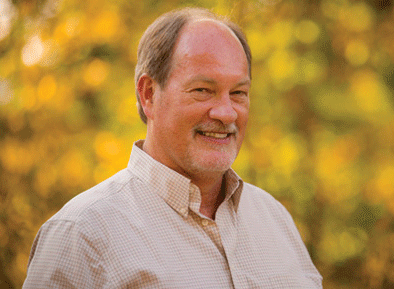Mark Thompson Appointed Interim Dean of the College

Colgate welcomes Dr. Mark D. Thompson as Interim Dean of the College. Previously, Thompson was Director of the Counseling Center.
This fall, Dr. Mark D. Thompson assumed his role as Interim Vice President and Dean of the College after working for 19 years as Director of the Colgate Counseling Center. Thompson succeeds former Dean Suzy Nelson, who vacated her position as Dean of the College at the end of the Spring 2016 semester. In his role as Dean, Thompson plans to be involved with increased inclusivity efforts on campus, the Residential Commons program and Haven – a new sexual assault resource center.
Haven, located in the basement of Curtis Hall, is a newly-established support center for survivors of sexual assault, sexual violence and relationship violence on campus. A branch of the Counseling Center, it provides clinical service, individual and group counseling and outreach training and education. Students can access Haven by making appointments and going during its walk-in hours.
These resources existed at Colgate before Haven was established, but Haven intends to integrate these services for student convenience. According to Thompson, Haven came into existence partly as a response to the protest on campus in the fall of 2015. Last November, members of the Association of Critical Collegians (ACC) and Colgate Forward planned a protest outside of the
Center for Women’s Studies. This was a reaction to student frustrations with the administration’s response to data released by the Higher Education Data Sharing Consortium, and addressed sexual violence on Colgate’s campus. A year later, Haven aims to serve as an on-campus support center for survivors of sexual assault.
Thompson believes Colgate has also responded to calls for greater inclusivity, demonstrated in its first-year student orientation. During this time dedicated to welcoming new students, first-years participated in three activities directly related to the topic of diversity. First, students listened to a presentation by Dr. Maura Cullen, one of the nation’s principal authorities on diversity and inclusion. Second, they participated in “Colgate Conversations,” in which faculty members and students talk specifically about “differences” in race, class, sex and sexual orientation. Finally, students attend “In Your Company,” during which members of the senior, junior and sophomore classes share personal stories, often relating to identity and diversity.
Both the Class of 2019 and the Class of 2020, which compose 50 percent of the Colgate student body, have participated in this newly-structured orientation.
In addition, diversity and inclusion have become important elements to consider in the hiring and evaluation of staff members.
Even with these structural changes, Thompson believes that creating widespread inclusivity on campus will be a long process.
“Building up a community that is inclusive and welcoming is a long process. Things have been done, and more still needs to be done in the future,” Thompson said.
This semester, the Bryan Complex was opened as the second branch of the Residential Commons. The Bryan Complex underwent extensive renovations over the summer.
Sophomore Rachel Huang believes the Bryan Complex will be an important addition to the Residential Commons.
“Bryan should be a great place for first-years,” Huang said. “The Edge Café connects all four towers, and is bright, nice and spacious. Students can hang out here [and] have discussions. It does give a sense of community.”
Sophomore Yesu Carter, a Community Leader in the Bryan Complex, discussed programming efforts throughout the building.
“To speak on the entire complex, we really wanted a space where something was happening every week or so,” Carter said. “Cookies and Chill was our first program. It was an overwhelming success; residents from West Hall and all houses in the Complex came to play games and eat together.”
Colgate is striving toward a plan where all first-years will eventually be housed in four different Residential Commons.
“The idea behind Residential Commons is that students’ social, intellectual and residential life are not separated. By having physical space in the commons to study and socialize, having specific sets of FSEMs [first-year seminars] and having shared events and activities, students living in the commons can enjoy their integrated campus life,” Thompson said.
Thompson articulated his passion and vision for the school.
“I love working with smart, energetic, innovative students,” Thompson said. “This career has been very stimulating, and I am glad and honored to work with these students at an important time of their lives.”
Thompson also spoke about his hopes for the future of Colgate.
“We live in a very troubled time, and my hope for Colgate is that we can keep providing students with the kind of relevant education so that when students go out [into] the world, they can make a difference and contribute to the world. To achieve this goal we still have a lot to work on. I hope every student can feel respected and recognized on this campus. I hope every student can feel that they have something to contribute and that they do make a difference. I hope every student can feel cared for and can take care of one
another,” Thompson said.






